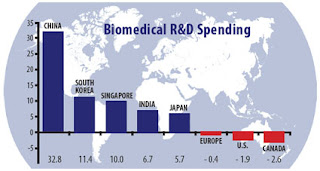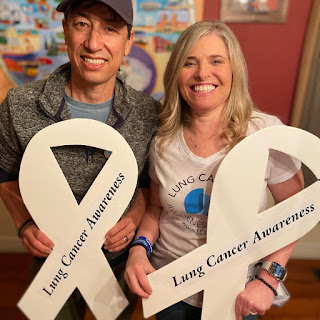My Biomedical Research Advocacy Continues
I have often written about the need for adequate research
funding and the challenge researchers have funding their labs. The cancer
researchers that I met over the past 4 years consistently told me they spend up
to 75% of their time fundraising - between writing grants to the National Institues of Health (NIH), private
foundations and public charities, and meeting with individual donors. Scientists
like John
Whetstine at Massachusetts
General Hospital happily meet with people to talk about their research and John works a lot of hours writing grants. The more time he spends in his lab the less
time he has to test new ideas. Another scientist, Dr. Wayne Marasco at Dana-Farber Cancer Institute laments the
fact that he could be in the lab making discoveries were it not for the fact
that he has to spend so much time writing grants. And in oncology, the chance
of receiving an NIH grant is only 10%. Having now spent almost a year at FRAXA Research Foundation, I see that it is
no different in research labs that study fragile X and other neurological
disorders.
FRAXA has poured over $26 million into fragile X
research, funding research projects across many different laboratories and in 2017 funded some exciting projects such as drug repurposing, clinical trials and gene reactivation. These
labs could do so much more if they had the resources. However, as
with cancer research, fragile X scientists have the same challenge in securing funding. The time it takes to write grants to the NIH or Department
of Defense (DoD) takes up an inordinate amount of time. This is so frustrating
to me because many labs have theories that could be studied if time could be
freed up from work outside of the lab. Of course, it also points out the
important role that organizations like FRAXA play. FRAXA funding helps support post docs in the labs to test the
theories of primary investigators as well as their own hypotheses. A $50,000
grant from FRAXA can support one post doc for a year, which is a huge benefit
to a laboratory. FRAXA has supported many post docs over the years and many
have then made discoveries that led them to moving on to start their own labs.
This opens a space to bring in new post docs into the field. For example, FRAXA has
supported Dr. Mark Bear at Massachusetts
Institute of Technology (MIT) for many years. Several post docs from his
lab have since moved to open their own labs. A great example of this is Dr. Kimberly Huber, who started her own lab at UT Southwestern. Over time, this means that more
brilliant scientists are brought in to the field of fragile X research. Without
FRAXA’s support, this would not be possible. Another important role that FRAXA has played historically is de-risking research. By funding early basic and translational research, FRAXA has helped several labs use the data produced from FRAXA grants to apply for and receive NIH grants. For example, FRAXA
funded Dr.
Hongbing Wang’s lab and this lead to a large
NIH grant.
The United States still leads the world in biomedical
research spending but other countries are closing the gap. From 2007-2012 the U.S.
share of global public and private biomedical R&D investments dropped
from 51 to 45 percent, while a generation ago the U.S. funded as much as 80
percent of the global activity. Meanwhile, many Asian countries raised their
investments in the same period with double-digit annual growth rates, topped by
China's nearly 33 percent. This is concerning to me. I think we will see the
negative impact of this 20 years from now. The breakthroughs we see today were
paid for by research 20 years ago. The fact that the amount of research funded
by the NIH declined by nearly 25% between 2003 and 2015 is a huge
hit to research, and in particular to researchers starting out in their careers (post docs).
Therefore, I believe we need the government to up the ante on public sector
research funding, and private philanthropy must continue to play an important
role. This is why I continue to be an evangelist and advocate for biomedical
research funding.

